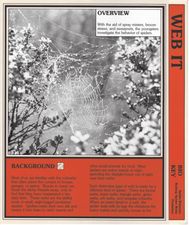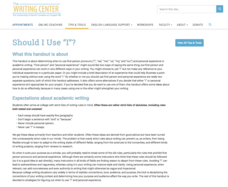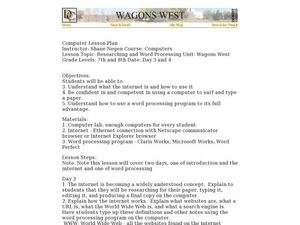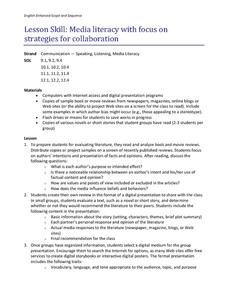Curated OER
Web It!
Looking for a way to bring prewriting into your informative writing unit? Use this lesson to reinforce writing skills in your eighth grade language arts class. Young writers use a web graphic organizer as a prewriting tool for expository...
University of North Carolina
Should I Use “I”?
Despite the formal nature of academic writing, personal pronouns frequently appear in high school and college papers. While your first instinct may be to cross them out, sometimes it's okay to use them, an idea covered in a handout that...
Curated OER
Be a Celebrity and Share Your Life with Us
Sixth graders discuss their likes, dislikes, hobbies, goals, and special events in their lives. They write a five paragraph autobiography focusing on style, transitions, and details. This is well-suited for either explanatory or...
Curated OER
As the Kids Come and Go: Mapping a Classroom
Map the classroom with your kids to help them understand how maps work and how to read them. The lesson starts off with a story about animals living and moving around the globe, and then kids create maps of their classroom to show how...
Curated OER
Non-Chronological Reports
Here is a short, ten-slide presentation which gives your students important tips on how to construct a well-written report. Tips include: putting questions into your report to make your readers think, and, how to end the report. Some...
Curated OER
Entrepreneurship: How to Begin
Students examine and identify the rudiments of a business plan. They locate and use resources about business plans on Internet.
Curated OER
Researching and Word Processing Unit: Wagons West
Help create confident and competent Internet users for research purposes. Middle schoolers conduct Internet research and compose a paper on the computer. They learn how to properly cite Internet references and explore net etiquette.
Student Handouts
Writing Exercises: The Presidency of Bill Clinton
How much do your pupils know about the Clinton administration? For this resource, class members respond to five questions about the Clinton presidency. They may need to research online or in their textbooks to find the information...
Smarter Balanced
The Internet
The Internet and how it has changed our lives is the focus of a series of activities that prepares learners for the performance task assessment on the influence of the Internet. Groups also brainstorm devices such as phone and cars that...
English Enhanced Scope and Sequence
Media Literacy with Focus of Strategies for Collaboration
Introduce your class to literary analysis with a series of activities that has them examine book and movie reviews. Groups then draft their own review of a text, select a digital medium, and craft a presentation.
Curated OER
School Newspaper
Fifth graders run a school newspaper on a school website and discover how to use various literary forms as they relate to the writing process. In this school newspaper lesson, 5th graders synthesize information from different sources,...
Curated OER
Problem Solving
Fifth graders read and write equations. In this equation writing lesson, 5th graders use real life scenarios to write equations. Students use manipulatives, draw pictures and make tables to understand how to write equations. Students...
Curated OER
Controlled Narrative Writing
Young scholars add details to their narratives. In this narrative writing instructional activity, students look at a simple four sentence narrative and add adjectives and adverbs to make it more descriptive. They do this activity whole...
Curated OER
Class Field Guide to the Sloughs
Students explore how to use field guides to identify wildlife. In this nature lesson students construct their own plant field guide.
Curated OER
Introductions and Conclusions
The format of the introduction and conclusion paragraphs in an expository essay are the focus of short presentation that details how to craft these all-important sections of a paper. No specific examples are included.
Curated OER
Digging Up Dino Data
Third graders use the Internet to research a specific dinosaur. They work in pairs and individually to browse dinosaur websites, take notes on pertinent information, write, edit and illustrate reports. They post their work.

















